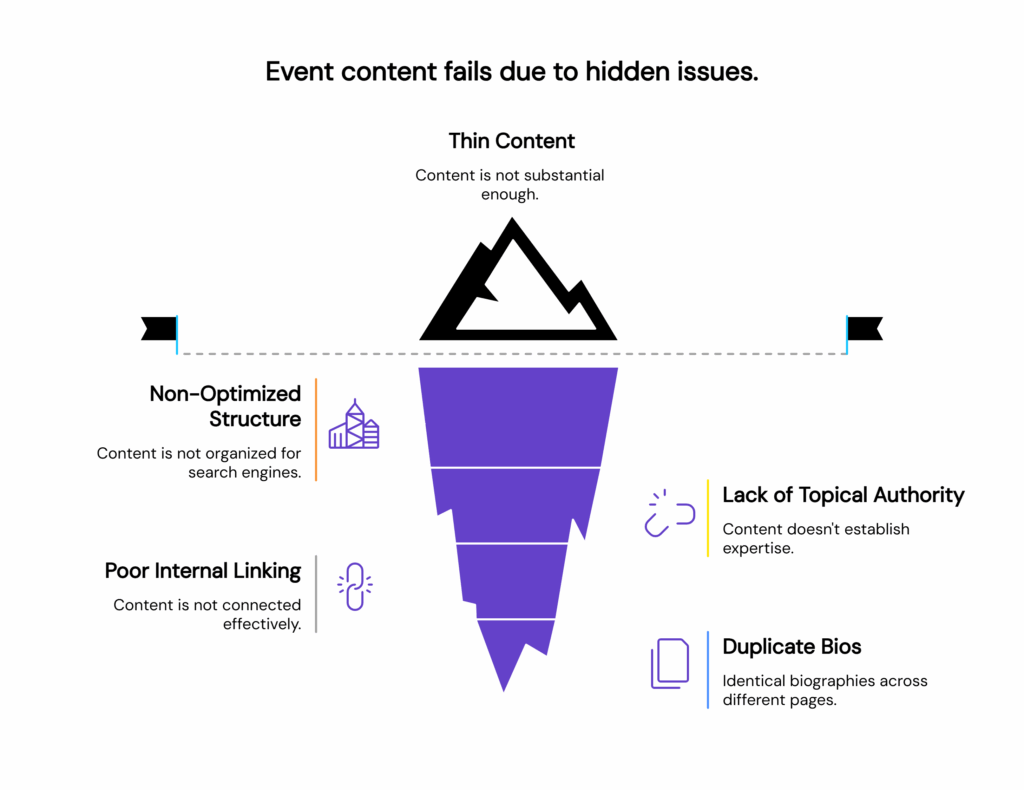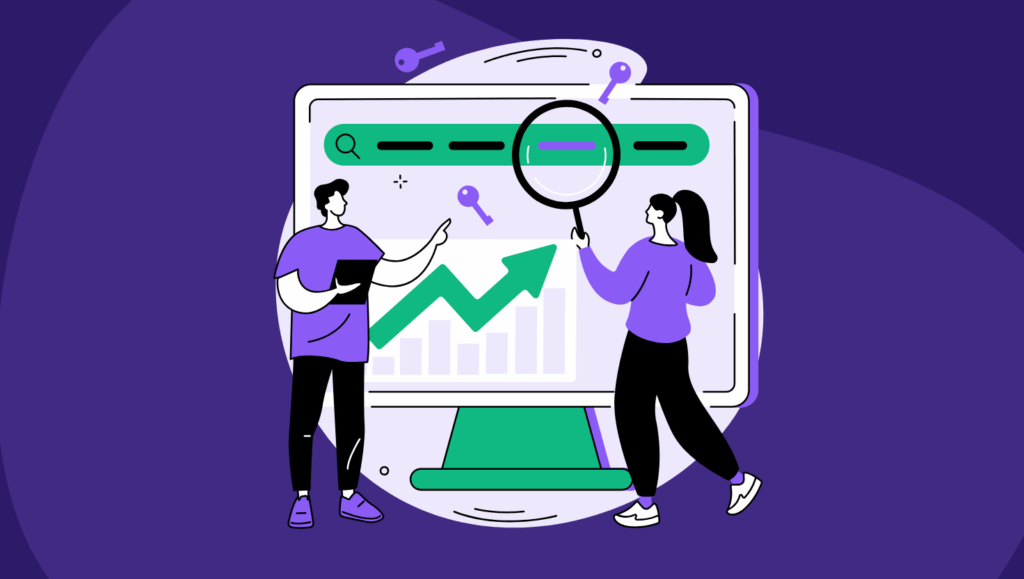You spend weeks creating speaker articles, agenda blogs, and exhibitor previews in preparation for an event. They’re meant to drive traffic, build anticipation, and highlight expertise. But when you check your analytics dashboard, the numbers don’t add (read: show) up: low impressions, poor click-throughs, and traffic that falls flat.
That’s striking when you consider that 68% of online experiences still begin with a search engine in 2025, according to BrightEdge. If your event content isn’t optimized for discovery, you’re missing the entry point for most of your audience.
But unfortunately, most event-led media content isn’t inherently built to rank. Speaker bios are too thin. Agenda pages aren’t optimized. Additionally, exhibitor previews often fail to align with broader editorial strategy and guidelines.
This blog explains why these pages fail, then lays out a tactical SEO playbook, backed by real before-and-after examples, that turns fleeting event pages into evergreen, discoverable traffic assets.
Why Event Content Fails in Search
Event coverage typically suffers from four major SEO problems:
1. Thin Content
- A typical speaker page has 100–150 words copied from a PR deck.
- Google doesn’t consider this “helpful content” and won’t prioritize it.
2. Non-Optimized Structure
- No clear H1/H2 hierarchy.
- Titles like “Meet Jane Doe” don’t target “AI in Retail speaker Jane Doe.”
- Metadata and alt-text are missing.
- Findings from BlueTone Media show that well-structured data can increase website CTRs by up to 40%.
3. Lack of Topical Authority
- Speaker blogs are published in isolation.
- No links to related editorial content (whitepapers, podcasts, or trend analysis).
- Google can’t see how they fit into your site’s expertise.
That matters because the top 3 search results capture 54.4% of all clicks. Without demonstrating topical authority, event content won’t break into those positions and will remain practically invisible.
4. Poor Internal Linking
- No connections between agenda pages, exhibitor previews, or evergreen hubs.
- As a result, the internal linking strategy SEO is broken, leaving content invisible.
5. Duplicate Bios
- The same speaker description appears across multiple event sites.
- Google struggles to determine which version to rank.
- Research confirms these pitfalls: without structured content, event SEO opportunities are wasted.

Here’s What Discoverable Event Content Looks Like
High-ranking event content usually has:
- Rich abstracts → Summaries that highlight speaker expertise and preview session insights.
- Schema markup → Event + Person schema so search engines can display rich results.
- Topic clusters → Speaker articles grouped under themes like “AI in Healthcare.”
- Strong linking → Cross-linked to evergreen thought-leadership articles.
- Evergreen URLs → Avoid year-specific slugs; let pages build long-term authority.
Tactical SEO Playbook
Here’s the step-by-step method to make event content discoverable:
1. Build Topic Clusters
- Create a hub page (e.g., “AI in Finance Summit 2025”).
- Under it, publish related speaker articles SEO pages.
- This signals to Google that your site covers the topic comprehensively (topical authority SEO).
2. Use Schema for Events and Speakers
- Add Event schema for agenda details (date, time, venue).
- Add Person schema for speaker details (role, organization).
- Add FAQ schema to agenda pages to capture long-tail queries.
3. Write Value-Driven Summaries
Instead of:
“Jane Doe is VP of Product at X. She has 20 years of experience in retail innovation.”
Try:
“Jane Doe, VP of Product at X, will share how AI-driven personalization increased customer retention by 27% in global retail chains, highlighting practical frameworks attendees can apply.”
This improves agenda articles’ SEO while serving user intent.
4. Strengthen Internal Linking Strategy
- Every speaker page links to the event hub.
- Each agenda article links to 2–3 evergreen blogs.
- Exhibitor previews link to relevant industry content.
5. Make URLs Evergreen
- Bad: /2025/speakers/jane-doe
- Good: /speakers/jane-doe (content updated annually, but URL stays).
Now, even with a strong playbook, there’s a practical challenge: events are massive content machines. You’re not optimizing five pages, you’re optimizing 50, 100, or sometimes hundreds across multiple events. Doing this manually can consume weeks and overwhelm even the most experienced marketing teams.
That’s where AI workflows come in. Instead of replacing editorial strategy, they help scale it efficiently. In fact, 67% of SEO professionals say the main benefit of AI SEO tools is automating repetitive tasks (SeoClarity), with time-saving remaining the top practical reason for adoption.
- SEO Agent → surfaces high-intent keywords (“exhibitor previews SEO,” “event content optimization”) and maps internal link opportunities.
- Smart Reading Agent → extracts speaker themes from decks and transcripts, creating summaries without manual transcription.
- Knowledge Agent → helps visitors easily explore your content, boosting engagement time that strengthens brand authority and indirectly supports SEO.
Together, these enable faster, AI-powered event SEO without sacrificing editorial quality.
Speaker bios and agenda blogs shouldn’t disappear after an event. With event content SEO, schema for events, and a thoughtful internal linking strategy, you can continue driving traffic, building authority, and reinforcing your editorial presence throughout the year.
Stop treating event pages as disposable. Start treating them as evergreen discoverable assets.
FAQs – Frequently Asked Questions
Q. Why don’t speaker articles rank on Google?
A. Some of the major reasons are: they are usually thin, duplicated across event sites, and lack topical authority or schema. Without depth, structure, or unique value, Google has little incentive to prioritize them over richer, better-optimized content.
Q. How can I make event agenda pages SEO-friendly?
A. Use keyword-rich titles that reflect session topics, add schema markup for structured data, and include FAQs for long-tail queries. Linking agenda pages into topic clusters also helps build authority and makes them discoverable beyond the event.
Q. What schema markup should I use for events?
A. Event schema captures agenda details like time, venue, and dates, while Person schema highlights speaker information. Adding an FAQ schema on agenda pages also boosts visibility in search by surfacing attendee-focused queries.
Q. Is internal linking really that important for event SEO?
A. Yes. Internal linking connects speaker bios, agenda pages, and exhibitor previews back to evergreen hubs. This strengthens your site’s authority signals and ensures event-led content doesn’t remain isolated or invisible in search.
Q. Can AI improve event content discoverability?
A. Yes. AI can summarize abstracts from decks or transcripts, suggest high-value internal links, and even automate schema generation. This enables faster optimization of 100+ event pages, while maintaining strategic and editorially strong content.


